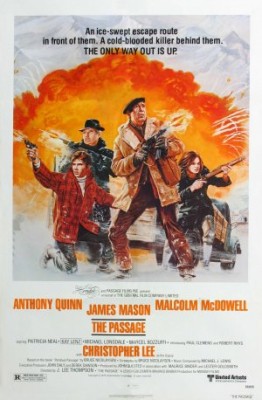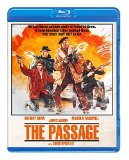| Reviews & Columns |
|
Reviews DVD TV on DVD Blu-ray 4K UHD International DVDs In Theaters Reviews by Studio Video Games Features Collector Series DVDs Easter Egg Database Interviews DVD Talk Radio Feature Articles Columns Anime Talk DVD Savant Horror DVDs The M.O.D. Squad Art House HD Talk Silent DVD
|
DVD Talk Forum |
|
|
| Resources |
|
DVD Price Search Customer Service #'s RCE Info Links |
|
Columns
|
|
|
Passage, The
But the entire enterprise is nearly torpedoed by a single appalling performance completely out of synch with the rest of the picture. Cast as the Nazi, actor Malcolm McDowell (A Clockwork Orange, Time After Time) felt his character should be played as a distillation of everything evil about Nazism, a decision he says was fully supported by Quinn and director J. Lee Thompson (The Guns of Navarone) though not by co-star James Mason, who plays the patriarch McDowell's Nazi wants to capture and bring back to Germany. Mason argued McDowell performance belonged in a different movie. He was right.
Scenes McDowell isn't in are generally pretty good while those featuring the actor are simultaneously ludicrous, campy, and unpleasant. In the final analysis, the film is still okay but almost ruinously schizophrenic.
A Scorpion Releasing title via Kino Lorber, the Blu-ray looks decent but not great in its new HD master, although helped along with several good supplements, including an interesting interview with McDowell himself.
French Resistance fighters Renoudot (Michael Lonsdale, The Bride Wore Black, Moonraker) and Perea (Marcel Bozzuffi, the hitman from The French Connection) recruit a reluctant, never-named Basque shepherd (Anthony Quinn) to escort chemist Professor Bergson (James Mason), wanted by the Nazis, from an attic hideaway in Toulouse, across the treacherous Pyrenees, into neutral Spain. The Basque wants no part of it for it means he'll be away from his sheep for at least four days; more than that and they'll all die. A large payoff of 5,000 pesetas persuades him.
In Toulouse, however, the Basque learns that Bergson won't go alone - he insists on bringing his frail wife, Ariel (Patricia Neal), adult daughter Leah (Kay Lenz, of Breezy), and teenage son, Paul (Paul Clemens). The Basque is incredulous at the very idea, an impossible task, but just then Germans, led by SS Capt. Von Berkow (McDowell), begin searching the home of Madame Alba (Rose Alba), where the family has been hiding, and the Basque has no choice but to flee, family in tow.
Cheery Von Berkow sadistically tortures Alba and especially Renoudot. In one especially nasty bit he chops off the Frenchman's fingers in a kitchen as if they were parsley. The Basque and the Bergsons hide out with a band of sympathetic Gypsies, led by "The Gypsy" (Christopher Lee) and his "Gypsy Son" (Robert Rhys). Initially believing Leah to be a Gypsy herself, Von Berkow rapes and humiliates her before realizing that she's Bergson's daughter (ridiculously, Von Berkow wears a swastika on his underwear). The Bergsons, however, escape again, and begin their arduous trek up and over the Pyrenees. Von Berkow, led by a French mountain guide (Peter Arne, curiously dubbed by Robert Rietty), trail closely behind them.
The Guns of Navarone (which co-starred Quinn) positively cursed director J. Lee Thompson for the remainder of his career. Virtually everything he made after was unfavorably compared to that great success. In fact, The Passage is handsomely produced in most respects, despite an overuse of hand-held cameras and other minor complaints. Larger-than-life Quinn could be quite hammy when left to his own devices, but he keeps his acting in check here; it's a good performance. Mason, whose fugitive chemist mostly sits by while Quinn and others do all the heavy lifting, doesn't have much of a part, but Patricia Neal, Christopher Lee, and especially Michael Lonsdale are very good.
Neal, herself frail following a nearly-fatal stroke while pregnant in 1965, and having suffered all manner of personal tragedies with her other children, is well cast as the mother in The Passage. Pulled up the mountainside in waist-deep snow, she really does look ready to collapse at any moment, and a scene involving her character's bravery is particularly memorable.
Indeed, moments like Neal's big scene are so completely at odds with McDowell's scenery chewing that director Thompson, never particularly assertive with actors, gets the blame for such wild inconsistency. Bruce Nicolaysen, in adapting his own novel, Perilous Passage, and who wrote no other films, deserves part of the blame, too, of course. McDowell reportedly ad-libbed some bits of business, such as the swastika on the underpants, but Von Berkow's words and actions are mostly the author's.
Still, it's a shame McDowell didn't opt for something no less terrifying yet far more subtle along the lines of Christoph Waltz's brilliant character and performance in Quentin Tarantino's Inglourious Basterds (2009).
One final note: This may be the only big-budget film featuring title design by one of its own producers. Maurice Binder, famous for his work on most of the 007 films during the Sean Connery to Timothy Dalton years, earned a "produced in association with" credit on The Passage. How he came to such a position, his only credit in this capacity, is unknown to this writer.
Video & Audio
Newly remastered, The Passage has a pleasing film look with a fair amount of visible grain. It's a bit dark and slightly dupey here and there, but mostly looks quite good. The film was shot in Technovision with 2.35:1 anamorphic theatrical prints. The 2.0 DTS-HD Master Audio mono is fairly typical of 1979 productions not opting for Dolby or magnetic stereo release prints: adequate but very underwhelming by today's standards. No subtitle options and the disc is region A encoded.
Extra Features
Supplements include a half-hour interview with Malcolm McDowell, who makes the case for his unusual performance. Alternately forthright and gossipy, he dishes dirt, amusingly, on Quinn, Mason, and is especially merciless about Christopher Lee. (Had Lee died before or after the interview was conducted, I wonder?) A second, more predictable but still interesting half-hour featuring an interview with actor Paul Clemens is also included.
What is billed as an "Alternate Ending," also in high-definition and excellent shape, plays like a slightly more coherent, longer version of the same climax. Original trailers and TV spots, in standard-def, round out the extras.
Final Thoughts
Roughly 70% of The Passage isn't bad at all and worth a look. McDowell's scenes, on the other hand, are another matter, though fans of the actor's work in Caligula (also 1979) may find it campy and amusing. Still, Recommended.
Stuart Galbraith IV is the Kyoto-based film historian and publisher-editor of World Cinema Paradise. His new documentary and latest audio commentary, for the British Film Institute's Blu-ray of Rashomon, is now available.
|
| Popular Reviews |
| Sponsored Links |
|
|
| Sponsored Links |
|
|
| Release List | Reviews | Shop | Newsletter | Forum | DVD Giveaways | Blu-Ray | Advertise |
|
Copyright 2024 DVDTalk.com All Rights Reserved. Legal Info, Privacy Policy, Terms of Use,
Manage Preferences,
Your Privacy Choices | |||||||














